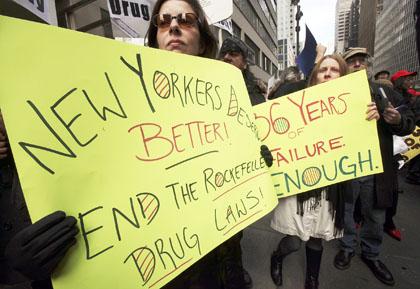By Howard Koplowitz
Albany leaders reached an agreement Friday to reform the Rockefeller Drug Laws that in part gives judges the option to send low−level, nonviolent drug offenders to treatment facilities instead of prison, state Senate Majority Leader Malcolm Smith (D−St. Albans) said Friday.
The deal “marks the beginning of a new era for New York’s sentencing laws,” Smith said in a statement. “Rockefeller Drug Law reform will reverse years of ineffective criminal laws, protect communities and save taxpayers millions of dollars that were wasted on the current policy.”
The so−called Rockefeller Drug Laws, which got their name from former Gov. Nelson Rockefeller, were passed in Albany in 1973 in the midst of a heroin epidemic that swept through the city and state.
Opponents of the laws claimed they were Draconian because they gave judges no discretion, forcing them to give mandatory minimum sentences to low−level offenders.
The reforms enable judges to send first− and second−time offenders to judicially approved alcohol and substance abuse treatment programs instead of prison, even if prosecutors object to the sentence.
Under the reforms, judges would also be able to dismiss such charges and seal conviction records for offenders who complete treatment programs.
While the reforms lessened the penalties for low−level, nonviolent offenders, they also increased penalties for so−called drug kingpins in an effort to target those “who profit from the addictions of others,” according to Smith.
State Sen. Shirley Huntley (D−Jamaica) welcomed the reforms.
“With more money going towards treatment of non−violent drug offenders, our state will finally have laws that give families and communities a fighting chance in the war on drugs,” she said in a statement.
Instead of going to a vote in both houses, the reforms will be added to the state budget — a move that incensed state Sen. Frank Padavan (R−Bellerose).
“Any attempt to include radical changes to the state law that has effectively combated drug dealing and has helped keep our community safe within the state budget is the highest form of political chicanery,” Padavan said in a statement. “To link so−called ‘reforms’ to the Rockefeller Drug Law with the state budget is an attempt at the complete avoidance of the rigorous and comprehensive debate that is required for such a plan and is intended to misdirect the public from the impact these dangerous changes will have on public safety.”
Padavan said he believed the existing laws were sufficient and noted that Queens District Attorney Richard Brown had concerns about giving judges discretion and the provision that would seal criminal records.
Reach reporter Howard Koplowitz by e−mail at hkoplowitz@cnglocal.com or by phone at 718−229−0300, Ext. 173.



































